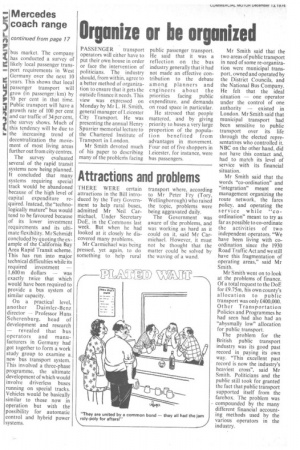Organize or be organized
Page 20

If you've noticed an error in this article please click here to report it so we can fix it.
PASSENGER transport operators will either have to put their own house in order or face the intervention of politicians. The industry should, from within, agree to a better method of organization to ensure that it gets the outside finance it needs. This view was expressed on Monday by Mr L. H. Smith, general manager of Leicester City Transport. He was presenting the annual Henry Spurrier memorial lecture to the Chartered Institute of Transport in London.
Mr Smith devoted much of his paper to describing many of the probleMs facing public passenger transport. He said that it was a reflection on the bus industry generally that it had not made an effective contribution to the debate among planners and engineers about the priorities facing public expenditure, and demands on road space in particular.
He stressed that people mattered, and by giving priority to buses a very large proportion of the population benefited from advantages in movement. Four out of five shoppers in Leicester, for instance, were bus passengers. Mr Smith said that the two areas of public transport in need of some re-organization were municipal transport, owned and operated by the District Councils, and the National Bus Company. He felt that the ideal situation — one operator under the control of one authority — existed in London. Mr Smith said that municipal transport had been sensitive to public transport over its life through the elected representatives who controlled it. NBC on the other hand, did not have this contact and, had to match its level of service with its financial situation.
Mr Smith said that the words "co-ordination" and "integration" meant one management organizing the route network, the fares policy, and operating the service while "coordination" meant to try as far as possible to co-ordinate the activities of two independent operators. "We have been living with coordination since the 1930 Road Traffic Act and we still have this fragmentation of operating areas," said Mr Smith.
Mr Smith went on to look at the problems of finance. Of a total request to the DoE for £9.75m, his own county's allocation to public transport was only £400,000. Other Transportation Policies and Programmes he had seen had also had an "abysmally low" allocation for public transport.
The problem for the British public transport industry was its good past record in paying its own way. "This excellent past record is now the industry's heaviest cross", said Mr Smith. Politicians and the public still took for granted the fact that public transport supported itself from the fare box. The problem was compounded by the many different financial accounting methods used by the various operators in the industry.




























































































